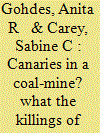| Srl | Item |
| 1 |
ID:
152296


|
|
|
|
|
| Summary/Abstract |
An independent press that is free from government censorship is regarded as instrumental to ensuring human rights protection. Yet governments across the globe often target journalists when their reports seem to offend them or contradict their policies. Can the government’s infringements of the rights of journalists tell us anything about its wider human rights agenda? The killing of a journalist is a sign of deteriorating respect for human rights. If a government orders the killing of a journalist, it is willing to use extreme measures to eliminate the threat posed by the uncontrolled flow of information. If non-state actors murder journalists, it reflects insecurity, which can lead to a backlash by the government, again triggering state-sponsored repression. To test the argument whether the killing of journalists is a precursor to increasing repression, we introduce a new global dataset on killings of journalists between 2002 and 2013 that uses three different sources that track such events across the world. The new data show that mostly local journalists are targeted and that in most cases the perpetrators remain unconfirmed. Particularly in countries with limited repression, human rights conditions are likely to deteriorate in the two years following the killing of a journalist. When journalists are killed, human rights conditions are unlikely to improve where standard models of human rights would expect an improvement. Our research underlines the importance of taking the treatment of journalists seriously, not only because failure to do so endangers their lives and limits our understanding of events on the ground, but also because their physical safety is an important precursor of more repression in the future.
|
|
|
|
|
|
|
|
|
|
|
|
|
|
|
|
| 2 |
ID:
171289


|
|
|
|
|
| Summary/Abstract |
Studies investigating gender gaps in the doctoral training of political science students have focused so far overwhelmingly on the US context. Although important research within this context has made strides in identifying the persistent challenges to women’s incorporation in political methodology, much remains unknown about whether women and men have different experiences in methods training during their PhD programs. We contribute to this debate by analyzing data from an original survey on the methods-training experiences of political science PhD students at different European universities. We assess whether gender gaps exist with respect to PhD students’ methods training and confidence in employing methods skills. Our findings show that women cover significantly fewer methods courses in their doctoral training. When women do participate in methods training, they show levels of method employment similar to their male colleagues. We discuss the implications of these findings in the context of European doctoral training.
|
|
|
|
|
|
|
|
|
|
|
|
|
|
|
|